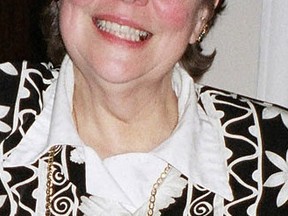The World is a Stage

Article content
Ernest Edward Young was born on March 1, 1898 in Tillsonburg to Theodore Young and Mary Ann Hearn.
He had several other siblings, all of whom would have been hard-pressed to get away with anything as children, as their father was the Fire Chief, Public Works Administrator, janitor for the Town Hall and street cleaner (remember there were horses back then!). When streets were too dusty, Theodore would water down the roads with the fire hose pump. He also rang the Town Hall bell at 7 a.m., 12 noon lunch break, 1 p.m., and 6 p.m. for the work days end. Also for other special events.
Back at the turn of the 20th century, Tillsonburg was made up of mostly British immigrants. In fact, Ernest’s mother had been born in England and his father’s parents had emigrated from England. It was no wonder that on Feb. 23rd, Ernest, one week shy of being 18 years old, signed up for WWI in Tillsonburg with Oxford’s Own 168th Battalion, Company C.
Ernest was 5-feet 9-inches with a 33-inch chest. His complexion was fair, like most with British blood. He had hazel eyes and black hair. The photo taken of the new recruits shows a thin-faced, serious looking boy with puppy dog eyes. Like the rest of his family he was a good Methodist. He was declared fit for duty with the Canadian Expeditionary Force the same day he signed up.
At 17 years old, Ernest was working as a labourer at Tillsonburg’s Shoe Factory which took up almost a town block, on the east side of Broadway north of Market St. It originally housed the Union Bicycle Works, but the Shoe Company took over the building in 1901 producing men’s work boots.
Like others who signed up during the Tillsonburg recruitment drive, he would have been shipped to train in London in June and by the middle of July the Battalion was sent to Camp Borden to complete more advanced training, like 'sham battles' and other tactical exercises, before being shipped overseas.
On October 30, 1916 he would have been aboard the S.S. Lampland with the rest of the 168th, departing from Halifax and arriving in Liverpool 12 days later. Unfortunately, the men of Oxford County did not remain together. In January 1917 the Battalion was split and the men went into either the 4th or 6th Reserve Battalions. Ernest didn’t end up in either of those, instead he fought with the 2nd Canadian Infantry Battalion. Although the the Oxford Battalion ceased to exist as a whole, the men went on to fight in many of the major battles of the Great War – Vimy, Passchendaele, Hill 70 and Arras.
You should recognize those names from our cenotaph.
It is that last name that we are interested in. The French handed over Arras to Commonwealth forces in the spring of 1916 and the system of tunnels upon which the town is built were used and developed in preparation for the major offensive planned for April 1917. They began the Faubourg D’Amiens Cemetery the month before that offensive began.
A year later, on March 28, 1918, the German Army focused on Arras, France. One section of their attack defeated 29 divisions. The next day Ernest was killed in action. That sounds so clean doesn’t it? A letter from one of his officers to his parents noted: 'Killed by exploding of a shell and died almost instantly, without regaining consciousness. We buried him in a military cemetery behind the line, with 8 of his comrades who were killed at the same time.'
The family would have received more letters of regret, including several from King George VI and Queen Elizabeth. Eventually they would have received a memorial medal for the loss of their son. Did these things assuage their pain? No, but it was they only way anyone could say they appreciated that their son gave his life to stop the Germans.
Eighteen years later, Ernest’s father Theodore, went to toll the town bell to start the two minutes of silence on November 11, 1936. This had been done in respect for the veterans since the end of the Great War, in which his own son gave his life. Assembled near the Town Hall were hundreds of citizens standing with bowed heads in tribute to the soldiers in Flanders' Field.
Mr. Young began to toll the bell. He was seen slipping to the floor with the rope in his hand. He died as he fell without a sound, honouring his son.